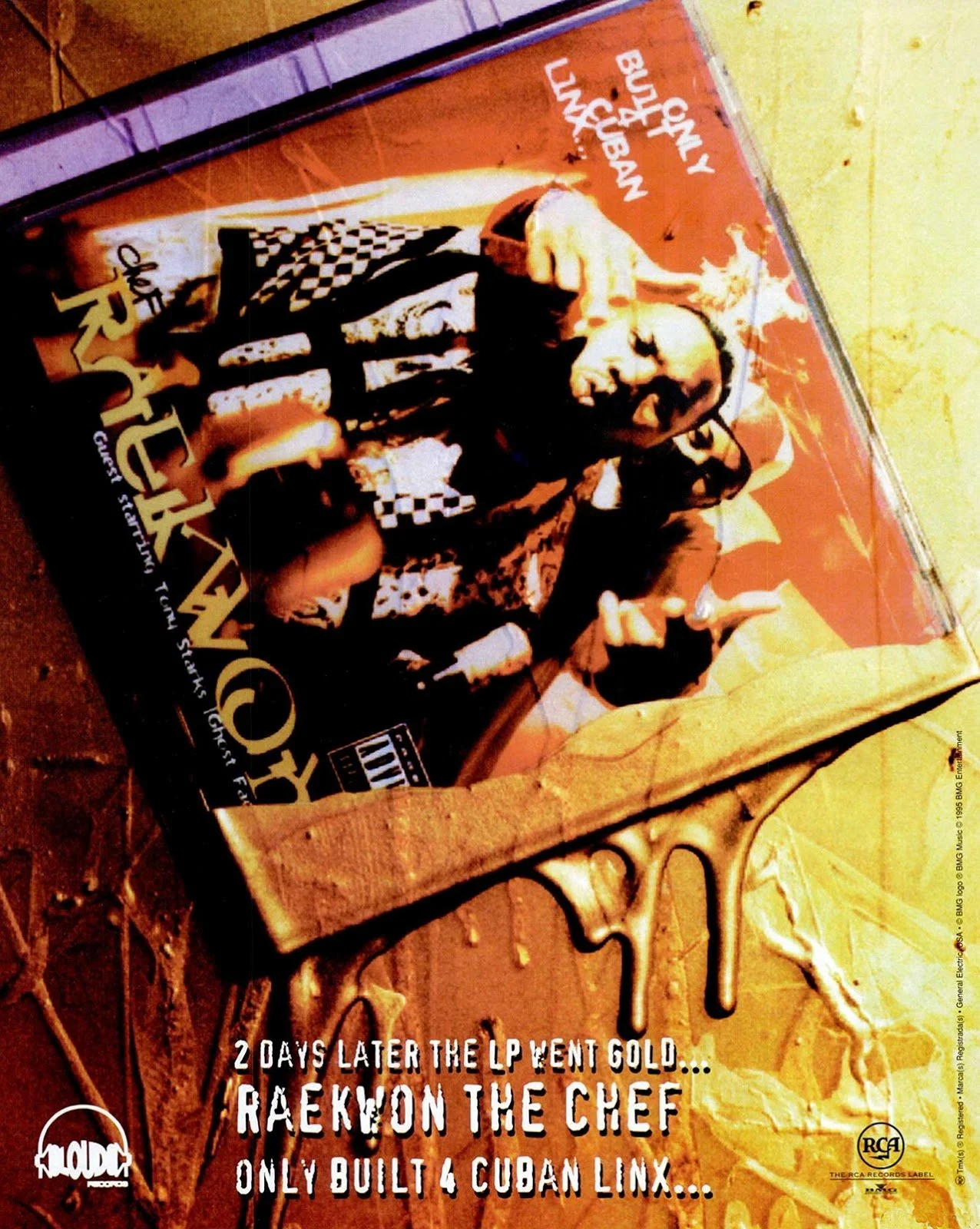Raekwon's 'Purple Tape' at 30: Celebrating Three Decades of the Universe Only Built 4 Cuban Linx…
The glaciers of ice never melted. Only Built 4 Cuban Linx... still reigns supreme.
I grew up in Brooklyn. Close enough to Staten Island to know it was there, but far enough that I never had a reason to go. No family, no friends, no business ever pulled me across that ferry or bridge. Still, somehow, there were little moments—backseat rides from family trips to Atlantic City, headphones on, blasting Tupac, Biggie and Onyx—that made me feel connected to Staten Island. It wasn't until 2018, though, that I really discovered Wu-Tang's very own Corey "Raekwon the Chef" Woods.
By then, I already knew the Clan. Every member had their own voice, their own slang, their own energy. But Raekwon stood out. His lingo was encrypted, and his style was cinematic. He sounded like a warrior from another world—but one built from real concrete, real struggle.
That world? Park Hill, Staten Island.
While hip-hop was born in the Bronx in the early 1970s, Staten Island remained off the map. The fifth borough—overlooked, segregated, and burdened by a quiet kind of racism. The cops were one thing. The mafia was another. Staten Island didn't just feel like another borough; it felt like another country.
But that's exactly where nearly half of the Wu-Tang Clan came from. Park Hill and Stapleton—the projects, the tension, the dealers, the stick-up kids. Raekwon, Ghostface Killah, Method Man, Inspectah Deck, and U-God are different styles, but they have the same survival story. And at the centre was Robert "RZA" Diggs, the visionary from Stapleton who saw the bigger picture.
He didn't just build a rap group. He built a brotherhood. And in that brotherhood, Raekwon found his voice. A voice that would narrate street life with the finesse of a novelist and the precision of a hustler. In the summer of 1995, he released Only Built 4 Cuban Linx... (aka the Purple Tape)—an album that didn't just shift the sound of hip-hop but expanded its universe. Mafioso rap. Crime cinema. The indigo cassette legend.
Raekwon and Ghostface, both hailing from rival sections of Staten Island, were caught in a cycle of violence, using guns to harm one another chronically. Yet, despite this conflict, they both sought a way out—a better life away from their hardships. RZA, the ringleader, the chief, the abbot, was the one who would steer them all toward a different path. After his failure as a solo artist, previously known as "Prince Rahkeem", RZA turned to the collective power of his local connections.
His cousins, Gary "GZA" Grice and Russell "Ol' Dirty Bastard" Jones, played pivotal roles in helping RZA bring his vision to life. In 1992, the Wu-Tang Clan was fully formed and released their first single, "Protect Ya Neck". The track gained massive radio play on stations like Stretch and Bobbito, propelling the Clan to secure a record deal and release their debut album, Enter the Wu-Tang (36 Chambers).
With that, the Clan's train was up and running. Following the album's success, RZA set its sights on securing individual deals for each member. Method Man was the first to sign with Def Jam Recordings. Ol' Dirty Bastard, however, faced resistance from Russell Simmons and others at Def Jam, who didn't understand his unique delivery and performance style.
They offered him little to no money. RZA, recognising the value of Dirty's creative control, thought it would be best for him to sign with Elektra, and he was right. Dirty became the second member of the Clan to land a record deal.
GZA signed with Geffen, released his second LP, Liquid Swords, and became the third member to achieve solo success. With Method Man's "All I Need" remix featuring Mary J. Blige getting constant radio play and Dirty's album going gold, questions about the other members' motivations started to arise.
As RZA shopped deals for Raekwon, Ghostface, U-God, and Inspectah Deck, the cost of these moves was significant—though the exact price remains unknown. He eventually secured a deal for Raekwon with Steve Rifkind, head of Loud Records. Loud had a strong roster of influential acts, including Mobb Deep, Big Pun (though not yet at the time), and The Alkaholiks. When the deal went through, it seemed almost too good to be true—Raekwon could now feature artists on individual tracks and entire albums. This is where the story of the Purple Tape begins…
Rae and Ghost—two artists who, despite hailing from rival sections of Staten Island, found common ground in their shared ambition. Both used their music to escape the harsh realities of their environment and strive for something greater.
Only Built 4 Cuban Linx… begins with a brief yet potent monologue from Rae and Ghost, explaining their struggles with perfection—a pursuit far beyond what most artists of the time aspired to. A slow, rising pan accompanies the opening sample from the 1989 John Woo film The Killer before they deliberate on the path they'll take.
As the sample fades out, Ghostface declares, "Word is bond, I'm the eyes that are in the back of you, kid!" and Raekwon responds, "Let's do it then!" This marks the birth of the Mafioso rap genre—a narrative style revolving around street authority and the intoxicating allure of the drug trade.
Without the hustle, there was no purpose, no meaning behind what Raekwon, Ghostface, or anyone involved in the trade was doing. The risk of falling victim to a rival's revolver or the law's cold grip only heightened the stakes, making the pursuit of success even more daunting.
Raekwon begins his lyrical journey by allowing RZA to paint an auditory picture of Park Hill, with its residents engaged in casual conversation—until an argument erupts and a gunshot rings out. The listener doesn't know who shot who, but with a track called "Knuckleheadz", Raekwon sets the tone: this is just another ordinary occurrence.
He effortlessly flows over RZA's simple yet effective beat, a loop of piano keys played in different octaves. Ghostface follows, ripping apart the track with impeccable breath control and tone, while U-God ends the verse with his own fluid, choppy flow. This track sets the stage for a critically acclaimed and universally recognised album.
Throughout the Purple Tape, the listeners are treated to fiery verses laced with narcotic and Islamic references, backed by RZA's distinct production. From "Knowledge God" to "Glaciers of Ice," Raekwon reveals moments from his own life, including near-death experiences. Affiliation holds immense weight in the streets—if you're seen with an enemy, you're automatically considered an ally of that enemy, which could seal your fate, whether you're aware of the conflict or not.
Street figures wielded more influence than rappers in the late '80s and '90s. Why? Because being associated with them—whether you were actually involved or not—could inspire fear or command respect. In the streets, fear often bred respect. Love was conditional, not guaranteed.
Rappers who spent time around these figures would be exposed to the darker side of life—kilos of cocaine stashed in abandoned apartments, the weight of it all leaving them both mesmerised and terrified. But Raekwon and Ghostface Killah weren't those rappers. Trust me on that. If you're a true hip-hop enthusiast, don't just take my word for it—press play on the classic posse cut, "Guillotinez".
It opens with the karate-flick dialogue sample that Wu-Tang is known for, as RZA once again allows each member to shine. The first verse, delivered by Inspectah Deck, starts with the legendary line: "Poisonous paragraph... it is the Inspectah Deck on a warpath." Every emcee takes their turn, ruthlessly tearing into the beat on their terms.
"If rap was crack… kingpin of the rap drug trafficking." This line from Ghostface on "Guillotinez" perfectly captures the essence of the album—a gritty, poetic exploration of the narcotic underworld and the struggles that come with it. Some listeners may get caught up in the drug-related themes, but they miss the larger picture: the constant battle for success and survival against the odds.
The aforementioned purple cassette itself almost feels like contraband smuggled out of that world, a physical embodiment of the album's coded lingo and street mythology. It wasn't just packaging—it became a recognisable street product, a symbol for those who knew the language, lived the life, or just wanted to understand it.
Another standout aspect of the Purple Tape is the abundance of memorable skits that provide a raw, unfiltered glimpse into the realities of street life. Skits and interludes serve as brief pauses between tracks, helping to maintain the album's flow while keeping the listener engaged. But beyond their function, these interludes reinforce the immersive, cinematic feel of the album—like snapshots from a crime saga unfolding in real-time.
One of the more controversial skits is "Shark Niggas (Biters)", where our duo subtly accuse The Notorious B.I.G. of "biting" Nas' iconic illmatic album cover for his own debut. But there's a deeper context here. In hip-hop, "biting" refers to copying another artist's style, which is considered one of the most dishonourable offences in the culture.
To 'bite' someone's swag—whether it's their lingo, style, or artistic concept—was a sure way to be discredited. In 1994, Nas and Biggie released their debut albums, illmatic and Ready to Die, respectively. While Nas won the battle regarding lyrical depth and creative output, Biggie triumphed in popularity and replay value. Ghostface, irate over the idea that "fake it 'til you make it" seemed to work for some, vented his frustration. Raekwon, more reserved, agreed but kept his thoughts vague to avoid potential fallout.
Ghostface wasn't worried about blowback; his focus was on being innovative. By the mid-'90s, Ghostface not only elevated the standards of Mafioso rap but also revolutionised fashion. 1994 marked the year that Only Built 4 Cuban Linx… popularised Versace silk shirts, woven crewnecks, and even boxer shorts as fashion statements. Ghostface's love for Clarks' Wallabees became legendary, with the album's interlude on "Glaciers of Ice" giving listeners a glimpse into his creative mind. He imagined ways to reinvent and revitalise the Clarks brand, which he did by imbuing it with the essence of street style. Through the album and his association with the brand, Ghostface helped change the cultural perception of Clarks' Wallabees forever.
With hit songs like "Juicy" by The Notorious B.I.G. and "Gangsta's Paradise" by Coolio dominating the airwaves, Raekwon needed to craft a track to attract a female fanbase and potentially boost album sales.
Before the LP dropped, Rae dropped the double single "Ice Cream/Incarcerated Scarfaces." At the same time, it stayed true to the album's drug trade theme; the single catered to a broader audience, particularly those who couldn't personally relate to the street hustle.
The song featured a catchy hook from Method Man, an intimately seductive verse from Ghostface Killah, a laid-back yet coded description of an Asian woman by Raekwon, and a hilariously memorable verse from Cappadonna. Each contribution highlighted the track's purpose—creating a dynamic single that was both accessible and engaging.
When you feature multiple emcees on a track, and that track becomes the lead single, ensuring each verse complements the others is crucial. This way, listeners can enjoy the whole four-minute ride without skipping a beat. It's an unwritten rule in songwriting that goes a long way in keeping the track fresh and interesting.
At one point, the listener is met with a gentle calm, only to be thrust into Raekwon and Ghostface Killah's exploration of belief. On "Heaven & Hell", Raekwon rhymes over a drumless beat with a soothing melody that almost forces the listener's mind to drift into their own world.
Ghostface Killah joins in with a "back and forth" approach, creating space for each other to breathe while building on their 'stick-up kid' narrative. Two men in their mid-twenties, starving for the riches that only money can provide. In their world of Shaolin, they can dismantle adversaries who appear wealthier than them through robbery. They rob some competitors at gunpoint, taking what they can and reaping the benefits of their newfound fortune. Ultimately, their pockets are full, surrounded by friends, family, and beautiful women.
“The ‘Purple Tape’ may be one of the greatest hip-hop albums of all time […] it is the holy grail of a street rap album.”
Here's an undocumented secret behind the album. Only Built 4 Cuban Linx… was initially supposed to be called Wu-Gambinoz, a tribute to the infamous Italian crime family, the Gambinos of New York City! According to Loud Records founder Steve Rifkind, Raekwon had proposed this name, but a sitdown' was arranged when it got to one of the higher-ups in the Gambino family. Rifkind's father had minimal ties with the Gambinos, and through him, it was made clear that Raekwon couldn't use the name Wu-Gambinoz. Despite initially resisting, Raekwon eventually gave in to their warning.
Raekwon looks to the North Star, an andromeda of 'jewelz' reflected in spoken word by the clan's guide, Popa Wu. Popa Wu reminds him of his sacrifices, recounting his days in Park Hill. The wisdom of older generations is often disregarded today, but in those times, the words of elders like Popa Wu were held in high regard and revered by those willing to set aside their arrogance and listen.
As the '70s sample fades in, adding to the calm vibe, Raekwon finally comes in with a choppy rhyme flow, shifting his subject matter. Instead of the drug trade, he reflects on growing up in the Park Hill towers, a time marked by poverty and the systemic destruction of Black empowerment.
Only Built 4 Cuban Linx… is an album of peak performances by Raekwon and Ghostface, offering a detailed narrative of crime and Mafioso-themed scenarios rooted in Raekwon's reality. The heavy use of movie samples by RZA is an integral part of this narrative, shaping the transition from Raekwon's life before fame to his life as a celebrated artist.
Three decades on, Only Built 4 Cuban Linx… stands not merely as a seminal hip-hop LP, but as a cinematic artefact—an East Coast noir etched in purple plastic. It captured a moment, a mindset, and a movement. From Rae's raw storytelling to RZA's blistering, sample-heavy beatwork, the album elevated street rap into high art. Its influence runs deep, echoing through mafioso rap and the broader hip-hop canon—from Reasonable Doubt to Life After Death and beyond.
Certified platinum, lauded by critics, and mythologised by fans, Cuban Linx remains the benchmark for conceptual rap albums. Whether spun on wax, revisited on streaming platforms, or cited in hip-hop scholarship, it's not just a classic—it's the blueprint. In the words of Ghostface, it's "poetry in motion".
Stream the Purple Tape below:



